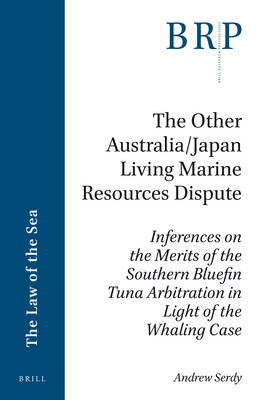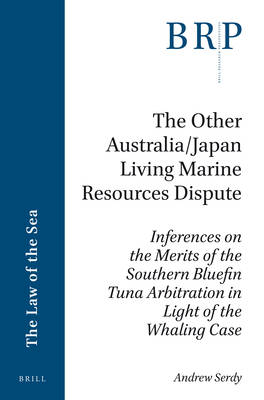
- Afhalen na 1 uur in een winkel met voorraad
- Gratis thuislevering in België vanaf € 30
- Ruim aanbod met 7 miljoen producten
- Afhalen na 1 uur in een winkel met voorraad
- Gratis thuislevering in België vanaf € 30
- Ruim aanbod met 7 miljoen producten
Zoeken
The Other Australia/Japan Living Marine Resources Dispute
Inferences on the Merits of the Southern Bluefin Tuna Arbitration in Light of the Whaling Case
Andrew Serdy
€ 128,45
+ 256 punten
Omschrijving
In 2000, the case brought by Australia and New Zealand against Japan's unilateral experimental fishing programme for southern bluefin tuna controversially failed to reach the merits for lack of the arbitral tribunal's jurisdiction. It was widely supposed that it would ultimately have failed anyway because of international courts' reluctance to consider scientific matters, the dispute's underlying cause being the parties' scientific disagreements regarding both the tuna stock itself and the nature and risks of the experiment. In 2014, however, the ICJ decided in Australia's favour the case against Japan's scientific whaling, based on flaws in the design of that experiment. Reviewing the tuna experiment's evolving design, the propositions it was to (dis)prove and the use Japan intended for that proof, Andrew Serdy suggests that similar factors were at play in both disputes and that a similar outcome of the tuna case, though not inevitable, would have been amply justified.
Specificaties
Betrokkenen
- Auteur(s):
- Uitgeverij:
Inhoud
- Aantal bladzijden:
- 100
- Taal:
- Engels
- Reeks:
Eigenschappen
- Productcode (EAN):
- 9789004339446
- Verschijningsdatum:
- 19/01/2017
- Uitvoering:
- Paperback
- Formaat:
- Trade paperback (VS)
- Afmetingen:
- 152 mm x 231 mm
- Gewicht:
- 113 g

Alleen bij Standaard Boekhandel
+ 256 punten op je klantenkaart van Standaard Boekhandel
Beoordelingen
We publiceren alleen reviews die voldoen aan de voorwaarden voor reviews. Bekijk onze voorwaarden voor reviews.











